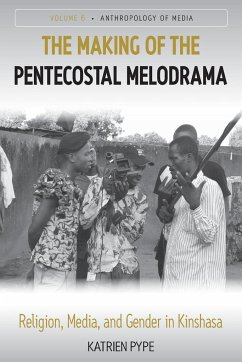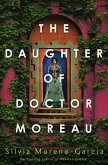- Broschiertes Buch
- Merkliste
- Auf die Merkliste
- Bewerten Bewerten
- Teilen
- Produkt teilen
- Produkterinnerung
- Produkterinnerung
How religion, gender, and urban sociality are expressed in and mediated via television drama in Kinshasa is the focus of this ethnographic study.
Andere Kunden interessierten sich auch für
![From Caligari to Hitler From Caligari to Hitler]() Siegfried KracauerFrom Caligari to Hitler24,99 €
Siegfried KracauerFrom Caligari to Hitler24,99 €![The Drama of Celebrity The Drama of Celebrity]() Sharon MarcusThe Drama of Celebrity21,99 €
Sharon MarcusThe Drama of Celebrity21,99 €![The Drama of Celebrity The Drama of Celebrity]() Sharon MarcusThe Drama of Celebrity21,99 €
Sharon MarcusThe Drama of Celebrity21,99 €![The Beautiful Ones The Beautiful Ones]() Silvia Moreno-GarciaThe Beautiful Ones20,99 €
Silvia Moreno-GarciaThe Beautiful Ones20,99 €![Velvet Was the Night Velvet Was the Night]() Silvia Moreno-GarciaVelvet Was the Night9,99 €
Silvia Moreno-GarciaVelvet Was the Night9,99 €![The Daughter of Doctor Moreau The Daughter of Doctor Moreau]() Silvia Moreno-GarciaThe Daughter of Doctor Moreau20,99 €
Silvia Moreno-GarciaThe Daughter of Doctor Moreau20,99 €![Refiguring Melodrama in Film and Television Refiguring Melodrama in Film and Television]() Agustin ZarzosaRefiguring Melodrama in Film and Television137,99 €
Agustin ZarzosaRefiguring Melodrama in Film and Television137,99 €-
-
How religion, gender, and urban sociality are expressed in and mediated via television drama in Kinshasa is the focus of this ethnographic study.
Hinweis: Dieser Artikel kann nur an eine deutsche Lieferadresse ausgeliefert werden.
Hinweis: Dieser Artikel kann nur an eine deutsche Lieferadresse ausgeliefert werden.
Produktdetails
- Produktdetails
- Anthropology of Media
- Verlag: Berghahn Books
- Seitenzahl: 350
- Erscheinungstermin: 1. Oktober 2014
- Englisch
- Abmessung: 229mm x 152mm x 19mm
- Gewicht: 532g
- ISBN-13: 9781782386810
- ISBN-10: 1782386815
- Artikelnr.: 41619557
- Herstellerkennzeichnung
- Books on Demand GmbH
- In de Tarpen 42
- 22848 Norderstedt
- info@bod.de
- 040 53433511
- Anthropology of Media
- Verlag: Berghahn Books
- Seitenzahl: 350
- Erscheinungstermin: 1. Oktober 2014
- Englisch
- Abmessung: 229mm x 152mm x 19mm
- Gewicht: 532g
- ISBN-13: 9781782386810
- ISBN-10: 1782386815
- Artikelnr.: 41619557
- Herstellerkennzeichnung
- Books on Demand GmbH
- In de Tarpen 42
- 22848 Norderstedt
- info@bod.de
- 040 53433511
Katrien Pype is an Associate Professor at University of Leuven and a Honorary Research Fellow with the Department of African Studies & Anthropology at University of Birmingham. She is co-initiator, with Miles Larmer and Rueben Loffman, of Congo Research Network, a platform that aims at enhancing dialogue and collaboration among Congo researchers in the humanities and social sciences.
Illustrations
Acknowledgements
On Language
Chapter 1. The First Episode
* Religion, Media and Kinshasa's Public Sphere
* Working with Cultural Producers
* Mediation and Remediation
* Research Methodologies
* Structure of the Text
Chapter 2. Cursing the City. The Ethnographic Field and the Pentecostal
Imagination
* The Heat of Kinshasa
* Competing Christianities
* Signs of the Apocalypse
* Witchcraft, or the Extraction of Life
* A Christian Key Scenario
* To Conclude: (Re-)Presenting the Apocalypse
Chapter 3. Of Fathers and Names. Social Dynamics in an Evangelising Drama
Group
* Bienvenu Toukebana: Setting up and Managing a Drama Group
* Fiston 'Chapy' Muzama: From Rapper to Pastor
* The Pastor and Maman Pasteur
* Clovis Ikala: Setting up a New Theatre Company
* Cinarc versus the Group of Muyombe Gauche: Rivalries among Troupes
* Mamy Moke and her Lover
* Ance Luzolo: Boasting with a Contact
* Conclusion
Chapter 4. Variations on Divine Afflatus. Artistic Inspiration, Special
Effects, and Sermons
* The Christian Artist
* The Pastor
* Special Effects as Visual Evidence
* Conclusion: Special Effects, Dreams and Melodrama
Chapter 5. Mimesis in Motion. Embodied Experiences of Performers and
Spectators
* Going into Seclusion
* Mimesis and Possession
* Spectators and the Sacred
* Visuality and the Senses
* Framing to Protect
* Closing Notes: Mediating Performances
Chapter 6. The Right Road. Moral Movements, Confessions and the Christian
Subject
* 'I am a Sinner'
* The Moral Movement
* A Modern Purification?
* To Conclude I: Mediation by the Holy Spirit: Transformation from Evil
to Purity
* To Conclude II: Melodrama and Rituals
Chapter 7. Opening up the Country. Christian Popular Culture, the
Generation Trouble and Time
* The Difference between Existing and Living
* The Generation Trouble
* The Healing Power of Narrative
* Past, Present and Future
* To Conclude: Youth, Christianity and Development
Chapter 8. Marriage comes from God. Negotiating Matrimony and Sexuality
(Part I)
* Against Ethnic Endogamous Marriages: Mayimona
* Incest Reconsidered: The Devouring Fire
* Negotiating Adultery: The Open Tomb
* Concluding Notes: Playing the Games
Chapter 9. The Danger of Sex. Negotiating Matrimony and Urban Sexuality
(Part II)
* Kindumba: Deviations from Accepted Sexual Practices
* God's Men Making Meaning of Sex
* Opposing Messages
* Women and Social Power: The Moziki Women and Vedettes
Conclusion I: Negotiations about Matrimony and Sexuality
Conclusion II: The Melodrama and the Feminine
Chapter 10. Closure, Subplots and Cliffhanger
* The Melodrama on and beyond the Screen
* Cultural Producers in an Apocalyptic Society
* The Recovery of the Salon
* The Next Episode
Bibliography
Index
Acknowledgements
On Language
Chapter 1. The First Episode
* Religion, Media and Kinshasa's Public Sphere
* Working with Cultural Producers
* Mediation and Remediation
* Research Methodologies
* Structure of the Text
Chapter 2. Cursing the City. The Ethnographic Field and the Pentecostal
Imagination
* The Heat of Kinshasa
* Competing Christianities
* Signs of the Apocalypse
* Witchcraft, or the Extraction of Life
* A Christian Key Scenario
* To Conclude: (Re-)Presenting the Apocalypse
Chapter 3. Of Fathers and Names. Social Dynamics in an Evangelising Drama
Group
* Bienvenu Toukebana: Setting up and Managing a Drama Group
* Fiston 'Chapy' Muzama: From Rapper to Pastor
* The Pastor and Maman Pasteur
* Clovis Ikala: Setting up a New Theatre Company
* Cinarc versus the Group of Muyombe Gauche: Rivalries among Troupes
* Mamy Moke and her Lover
* Ance Luzolo: Boasting with a Contact
* Conclusion
Chapter 4. Variations on Divine Afflatus. Artistic Inspiration, Special
Effects, and Sermons
* The Christian Artist
* The Pastor
* Special Effects as Visual Evidence
* Conclusion: Special Effects, Dreams and Melodrama
Chapter 5. Mimesis in Motion. Embodied Experiences of Performers and
Spectators
* Going into Seclusion
* Mimesis and Possession
* Spectators and the Sacred
* Visuality and the Senses
* Framing to Protect
* Closing Notes: Mediating Performances
Chapter 6. The Right Road. Moral Movements, Confessions and the Christian
Subject
* 'I am a Sinner'
* The Moral Movement
* A Modern Purification?
* To Conclude I: Mediation by the Holy Spirit: Transformation from Evil
to Purity
* To Conclude II: Melodrama and Rituals
Chapter 7. Opening up the Country. Christian Popular Culture, the
Generation Trouble and Time
* The Difference between Existing and Living
* The Generation Trouble
* The Healing Power of Narrative
* Past, Present and Future
* To Conclude: Youth, Christianity and Development
Chapter 8. Marriage comes from God. Negotiating Matrimony and Sexuality
(Part I)
* Against Ethnic Endogamous Marriages: Mayimona
* Incest Reconsidered: The Devouring Fire
* Negotiating Adultery: The Open Tomb
* Concluding Notes: Playing the Games
Chapter 9. The Danger of Sex. Negotiating Matrimony and Urban Sexuality
(Part II)
* Kindumba: Deviations from Accepted Sexual Practices
* God's Men Making Meaning of Sex
* Opposing Messages
* Women and Social Power: The Moziki Women and Vedettes
Conclusion I: Negotiations about Matrimony and Sexuality
Conclusion II: The Melodrama and the Feminine
Chapter 10. Closure, Subplots and Cliffhanger
* The Melodrama on and beyond the Screen
* Cultural Producers in an Apocalyptic Society
* The Recovery of the Salon
* The Next Episode
Bibliography
Index
Illustrations
Acknowledgements
On Language
Chapter 1. The First Episode
* Religion, Media and Kinshasa's Public Sphere
* Working with Cultural Producers
* Mediation and Remediation
* Research Methodologies
* Structure of the Text
Chapter 2. Cursing the City. The Ethnographic Field and the Pentecostal
Imagination
* The Heat of Kinshasa
* Competing Christianities
* Signs of the Apocalypse
* Witchcraft, or the Extraction of Life
* A Christian Key Scenario
* To Conclude: (Re-)Presenting the Apocalypse
Chapter 3. Of Fathers and Names. Social Dynamics in an Evangelising Drama
Group
* Bienvenu Toukebana: Setting up and Managing a Drama Group
* Fiston 'Chapy' Muzama: From Rapper to Pastor
* The Pastor and Maman Pasteur
* Clovis Ikala: Setting up a New Theatre Company
* Cinarc versus the Group of Muyombe Gauche: Rivalries among Troupes
* Mamy Moke and her Lover
* Ance Luzolo: Boasting with a Contact
* Conclusion
Chapter 4. Variations on Divine Afflatus. Artistic Inspiration, Special
Effects, and Sermons
* The Christian Artist
* The Pastor
* Special Effects as Visual Evidence
* Conclusion: Special Effects, Dreams and Melodrama
Chapter 5. Mimesis in Motion. Embodied Experiences of Performers and
Spectators
* Going into Seclusion
* Mimesis and Possession
* Spectators and the Sacred
* Visuality and the Senses
* Framing to Protect
* Closing Notes: Mediating Performances
Chapter 6. The Right Road. Moral Movements, Confessions and the Christian
Subject
* 'I am a Sinner'
* The Moral Movement
* A Modern Purification?
* To Conclude I: Mediation by the Holy Spirit: Transformation from Evil
to Purity
* To Conclude II: Melodrama and Rituals
Chapter 7. Opening up the Country. Christian Popular Culture, the
Generation Trouble and Time
* The Difference between Existing and Living
* The Generation Trouble
* The Healing Power of Narrative
* Past, Present and Future
* To Conclude: Youth, Christianity and Development
Chapter 8. Marriage comes from God. Negotiating Matrimony and Sexuality
(Part I)
* Against Ethnic Endogamous Marriages: Mayimona
* Incest Reconsidered: The Devouring Fire
* Negotiating Adultery: The Open Tomb
* Concluding Notes: Playing the Games
Chapter 9. The Danger of Sex. Negotiating Matrimony and Urban Sexuality
(Part II)
* Kindumba: Deviations from Accepted Sexual Practices
* God's Men Making Meaning of Sex
* Opposing Messages
* Women and Social Power: The Moziki Women and Vedettes
Conclusion I: Negotiations about Matrimony and Sexuality
Conclusion II: The Melodrama and the Feminine
Chapter 10. Closure, Subplots and Cliffhanger
* The Melodrama on and beyond the Screen
* Cultural Producers in an Apocalyptic Society
* The Recovery of the Salon
* The Next Episode
Bibliography
Index
Acknowledgements
On Language
Chapter 1. The First Episode
* Religion, Media and Kinshasa's Public Sphere
* Working with Cultural Producers
* Mediation and Remediation
* Research Methodologies
* Structure of the Text
Chapter 2. Cursing the City. The Ethnographic Field and the Pentecostal
Imagination
* The Heat of Kinshasa
* Competing Christianities
* Signs of the Apocalypse
* Witchcraft, or the Extraction of Life
* A Christian Key Scenario
* To Conclude: (Re-)Presenting the Apocalypse
Chapter 3. Of Fathers and Names. Social Dynamics in an Evangelising Drama
Group
* Bienvenu Toukebana: Setting up and Managing a Drama Group
* Fiston 'Chapy' Muzama: From Rapper to Pastor
* The Pastor and Maman Pasteur
* Clovis Ikala: Setting up a New Theatre Company
* Cinarc versus the Group of Muyombe Gauche: Rivalries among Troupes
* Mamy Moke and her Lover
* Ance Luzolo: Boasting with a Contact
* Conclusion
Chapter 4. Variations on Divine Afflatus. Artistic Inspiration, Special
Effects, and Sermons
* The Christian Artist
* The Pastor
* Special Effects as Visual Evidence
* Conclusion: Special Effects, Dreams and Melodrama
Chapter 5. Mimesis in Motion. Embodied Experiences of Performers and
Spectators
* Going into Seclusion
* Mimesis and Possession
* Spectators and the Sacred
* Visuality and the Senses
* Framing to Protect
* Closing Notes: Mediating Performances
Chapter 6. The Right Road. Moral Movements, Confessions and the Christian
Subject
* 'I am a Sinner'
* The Moral Movement
* A Modern Purification?
* To Conclude I: Mediation by the Holy Spirit: Transformation from Evil
to Purity
* To Conclude II: Melodrama and Rituals
Chapter 7. Opening up the Country. Christian Popular Culture, the
Generation Trouble and Time
* The Difference between Existing and Living
* The Generation Trouble
* The Healing Power of Narrative
* Past, Present and Future
* To Conclude: Youth, Christianity and Development
Chapter 8. Marriage comes from God. Negotiating Matrimony and Sexuality
(Part I)
* Against Ethnic Endogamous Marriages: Mayimona
* Incest Reconsidered: The Devouring Fire
* Negotiating Adultery: The Open Tomb
* Concluding Notes: Playing the Games
Chapter 9. The Danger of Sex. Negotiating Matrimony and Urban Sexuality
(Part II)
* Kindumba: Deviations from Accepted Sexual Practices
* God's Men Making Meaning of Sex
* Opposing Messages
* Women and Social Power: The Moziki Women and Vedettes
Conclusion I: Negotiations about Matrimony and Sexuality
Conclusion II: The Melodrama and the Feminine
Chapter 10. Closure, Subplots and Cliffhanger
* The Melodrama on and beyond the Screen
* Cultural Producers in an Apocalyptic Society
* The Recovery of the Salon
* The Next Episode
Bibliography
Index








